kyled00m said:Danpmss said:I'm surprised with how much more faithful to the book's overall experience they are being in this particular season. Seasons 1-3 (particularly after book 2) are a rushed mess of summarized major plot points with a particularly poor execution of the overall storytelling that makes Overlord such an engaging read.
In here it looks like they are actually trying to give us the more standard lore building and character driven developments instead. Still missing and reorganizing a bunch of things, but nothing as major of a problem as in the previous seasonal adaptations (in which they basically ruined entire character arcs and created plot-holes due to how they handled the expository non-chronological metanarrative of the books, which play out more like a mystery for the most part, and not fully focused on Nazarick characters at all).
Dedicated fans might want the novel perfectly re-enacted but those who just pick up the anime want to enjoy their time. Although there were obvious changes and some noticeable plot holes, you still enjoyed the series enough to reach this 4th season, and so have many anime-only people.
3 eps in, and this is definitely the better adapted Overlord has ever been, they are taking their time much better here. I hope they keep this quality going forward, even if they HAVE to abridge the story again. Just don't make it unsubstantial and broken like books 3-9. Normally, anime developers want to rush things for an action-oriented series during the slow and information-filled parts. Look back to when you were in middle school/high school and ask yourself if you were happy/excited to read a book the board of education wanted to shove down your throat.
In addition to pushing passed enormous paragraphs of dialogue, details, and more, they probably wanted to "finish" the arcs rather than saving 1-2 episodes for the next season. This is a flaw in today's anime where (for the most part,) anime conform to a fixed number of episodes (ie: 12, 13, 24-26) as opposed to random numbers (ie: Suzumiya Haruhi no Yuuutsu 14, Trouble Chocolate 20, Clannad 23, Death Note 37, Great Teacher Onizuka 43, Sailor Moon 46, Digimon Adventure 54, etc.). Furthermore, if they were " stupid" enough to do that 1-2 episode cliffhanger, the fans would probably start a riot (or something similar).
Remember, anime was originally made to hook people into buying and reading the novels, and it's primary target is people who haven't read the other media. Given this and the reasons above, they did a pretty good job on the first 3 seasons (even with some plot holes and changes).
Pardon me, but those you listed are still inside the overall broadcasting guidelines for seasonal TV Shows in Japan overall though. And if anything, anime nowadays CHANGED that with the surgence of streaming services and ONAs recently, so that anime aren't necessarily tied to a mandatory planning in regards to broadcasting plans first and foremost. Longrunners are exceptions to the format, and are usually followed by new longrunners in prime hours, so that their scheduled slots aren't a complete disaster.
Haruhi 1-cour (1 ep longer than the usual, followed by the 2-cour NHK ni Youkoso, thus making up for the timeslot with that being 24 eps)
Trouble Chocolate 2-cours (4 eps shorter than usual because it was cancelled)
Clannad 2-cours (24 episodes production planned, one of the eps was a special that got released in the last DVD set, so that the series could end just before April -beginning of next season- which had another anime starting the week after)
Death Note 3-cours (consecutive cours not being much different from a 2-cour 25 eps anime being directly followed by a 12 episode anime in the next season set, totalizing 37 eps).
Great Teacher Onizuka 4-cours (had a messy broadcasting schedule, so they produced 43 episodes and skipped several weeks for other programs in the same hour, which is why it ended up like that just before the start of the next cour coming up in October).
Sailor Moon 4-cours* (except it was a long-runner, and therefore the next seasons started immediately after in the same timeslot, and so continued for 200 eps in total)
Digimon Adventures Long-runner (same situation)
They ALWAYS divide them by trimonthly cours from the start in 1963, and choose a broadcaster that can fit the number of eps they are going for in a given slot a year or two prior to the start of the production (exceptions again being longrunners with more than 4 cours).
Only today's anime having a "fixed numbers" like you said is quite the myth, it's has remained unchanged from how things have been from the get-go tbh, and if anything, now we have more exceptions with streamed content.
The only thing that became more uncommon would be consecutive cours becoming much rarer to see around due to increased production costs, demand for varied content per season as the number of anime per season also has grown, and a myriad of other factors that aren't just "they just don't wanna do a broken longer number of eps because they wanna compact the content to follow a norm that is everpresent anyway".
Anyway, as for the other point regarding anime being originally made to hook people into buying novels is really wrong. From the start it was more on the opposite side instead.
Tezuka was and still is the God of Manga, and his anime productions for his adapted works were usually either completely new reimaginations of the plot for the new medium to take advantage of the episodic nature of other successful productions for kids outside of Japan in that era (Astro Boy and Gegege no Kitarou), or were compact, but expanded adaptations of their source materials (which became the new norm for a long while starting from Dororo, Ashita no Joe, etc...). At times becoming full stories by ending in different ways altogether (but still, ending).
The adaptations being used as advertisement for the manga/novel source material is actually a thing that started later with Slayers (in the case of novels) and long running shounen manga in general (due to how competition was established inside the magazine), way into the 90s already, more because of lack of resources for the demand and increased interest in shounen manga adaptations due to the boom started by Hokuto no Ken and explosively widened up by Dr.Slump and Dragon Ball in particular.
Such problem only increased and was almost permanently doomed to be decided by BD/DVD sales for each, in case sequels were ever to be produced, unless their anime were funded by the magazine in conjuction to a production team of a given studio considering volume sales (or in case of prime hour anime, funded by the broadcaster depending on viewership, or in rare circumstances cultural value, as it was the case of NHK funded anime series). That is, until streaming started to become mainstream and kinda saved a soon-to-be-considered doomed industry.
------------------------------------------------------------------
Btw, I don't remember saying this, and I'm not sure from where you quoted it, but I disagree with the statement anyway:
Dedicated fans might want the novel perfectly re-enacted but those who just pick up the anime want to enjoy their time. Although there were obvious changes and some noticeable plot holes, you still enjoyed the series enough to reach this 4th season, and so have many anime-only people.
In short, you don't need to have a 1:1 adaptation of anything, just something that portrays as faithfully as possible the overall content of the source material in question. People won't have as much fun if the adaptation sucks, even because anime-onlies will attack the source material for being bad when the adaptation was at fault, as it happened over the decades many times (for a recent example, Tokyo Ghoul).
A bad adaptation it's a bad representation in the much more mainstream audio-visual medium, so it always does more harm than good overall, and it sure was the case with Overlord too, considering most of the criticism it got in the forums and the reviews from anime-onlies.
But fans still have hopes to see at least some of their favorite moments in the series well adapted anyway, so they keep coming back (either that or they have a completionism problem and/or like to point out what makes which version better or worse as a recommendation to new fans, like me).
As it stands for now, I would go as far as to say "Watch ep 1-9 (which were alright), go read the books 3-9 and keep watching, otherwise you will ruin yourself a bunch of things in the story".
The big problem with Overlord may have started with it being just a appetizer for the book series (just around the time anime started getting funded and produced by streaming services), but it could still have been handled and executed much better. I know the first 9 eps sure did, despite all what was skipped. And a similar, much better situation can be seen here, through following the book's storytelling as they should have from the start. |



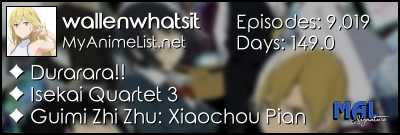


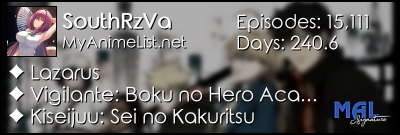


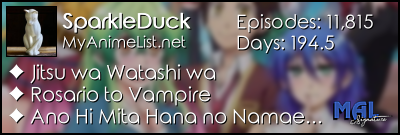

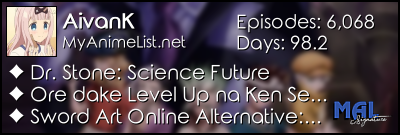
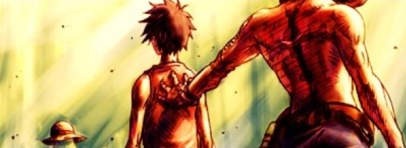


 on
on 


